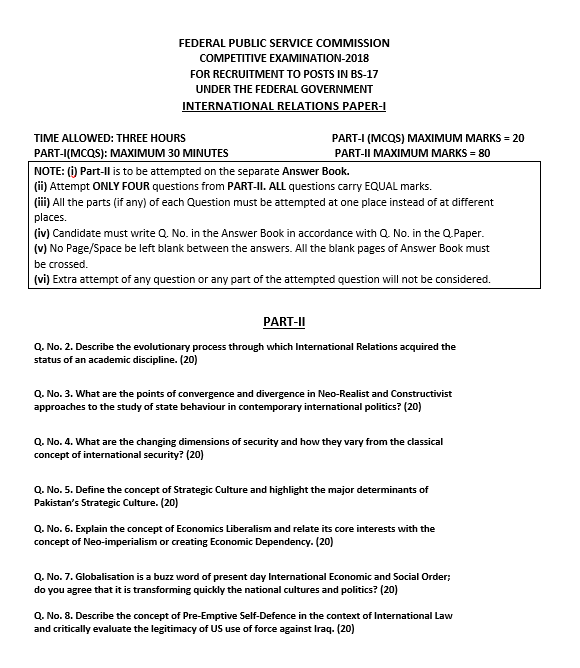CSS International Relations 2018 paper(a)
No. 2. Describe the evolutionary process through which International Relations acquired the status of an academic discipline. (20)
No. 3. What are the points of convergence and divergence in Neo-Realist and Constructivist approaches to the study of state behavior in contemporary international politics? (20)
No. 4. What are the changing dimensions of security and how do they vary from the classical concept of international security? (20)
No. 5. Define the concept of Strategic Culture and highlight the major determinants of Pakistan’s Strategic Culture. (20)
No. 6. Explain the concept of Economics Liberalism and relate its core interests with the concept of Neo-imperialism or creating Economic Dependency. (20)
No. 7. Globalisation is a buzzword of present-day International Economic and Social Order; do you agree that it is transforming quickly national cultures and politics? (20)
No. 8. Describe the concept of Pre-Emptive Self-Defence in the context of International Law and critically evaluate the legitimacy of the US use of force against Iraq. (20)
Summary of Questions:
No. 2. Describe the evolutionary process through which International Relations acquired the status of an academic discipline.
International Relations (IR) evolved into an academic discipline in the early 20th century, largely after World War I, when scholars sought to understand and prevent global conflicts. The field grew with the establishment of formal academic institutions and the development of various theories like realism and liberalism. Over time, it expanded to include diverse approaches, including international law, economics, and security studies, gaining recognition as an academic field in its own right.
No. 3. What are the points of convergence and divergence in Neo-Realist and Constructivist approaches to the study of state behavior in contemporary international politics?
Neo-Realism and Constructivism both seek to explain state behavior, but differ in their core assumptions. Neo-Realism focuses on the structure of the international system and states’ pursuit of power and security. In contrast, Constructivism emphasizes the role of ideas, identity, and norms in shaping state behavior. Both converge in recognizing the importance of the international system, but they diverge in how they view the sources of state behavior—one through material factors and the other through social constructs.
No. 4. What are the changing dimensions of security and how do they vary from the classical concept of international security?
The classical concept of international security focuses primarily on military threats between states. However, the changing dimensions of security now include non-traditional threats like environmental challenges, cybersecurity, economic instability, and human security. These new dimensions broaden the scope of security beyond the state-centric focus, addressing global risks that affect individuals and societies at large.
No. 5. Define the concept of Strategic Culture and highlight the major determinants of Pakistan’s Strategic Culture.
Strategic Culture refers to the set of beliefs, values, and practices that shape how a nation approaches security and defense. It is influenced by historical experiences, geography, political ideology, and the national psyche. For Pakistan, its strategic culture is heavily influenced by its military history, its rivalry with India, the importance of nuclear deterrence, and its security concerns in the region, particularly with regard to terrorism and border disputes.
No. 6. Explain the concept of Economics Liberalism and relate its core interests with the concept of Neo-imperialism or creating Economic Dependency.
Economic Liberalism advocates for free markets, limited government intervention, and international economic cooperation. It emphasizes that open trade and investment benefit all nations. However, critics argue that in practice, it can lead to Neo-imperialism, where economically dominant nations create dependency by controlling markets, resources, and financial systems in less developed countries, thus maintaining unequal power relations.
No. 7. Globalisation is a buzzword of present-day International Economic and Social Order; do you agree that it is transforming quickly national cultures and politics?
Globalization is indeed transforming national cultures and politics by increasing interconnectedness through trade, communication, and technology. It influences cultural exchange, alters traditional values, and can lead to political shifts as global issues like migration, human rights, and environmental concerns gain prominence. While globalization fosters economic growth, it can also challenge national identities and sovereignty, especially in terms of local political systems and cultural practices.
No. 8. Describe the concept of Pre-Emptive Self-Defence in the context of International Law and critically evaluate the legitimacy of the US use of force against Iraq.
Pre-emptive self-defense refers to the use of force by a state to prevent an imminent threat before it materializes. In international law, the right to self-defense is enshrined under Article 51 of the UN Charter, but the concept of pre-emption is controversial. The US invasion of Iraq in 2003, justified by the perceived threat of weapons of mass destruction, is widely debated. Critics argue that the action lacked solid evidence and violated international law, while supporters claim it was a legitimate response to a potential threat.
